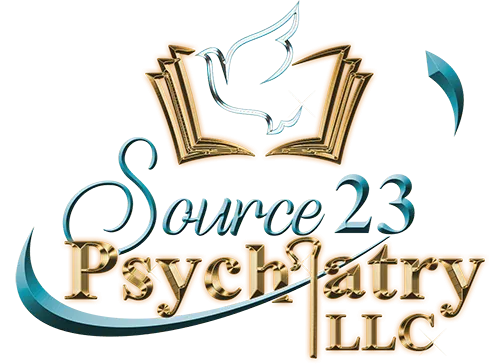You Don’t Have to Live with Debilitating OCD: We can Help
Obsessive-compulsive disorder is a mental health problem that affects everyday life — but how do you break the cycle of OCD? Please keep reading to discover how we can help you overcome the obsessions and compulsions to escape OCD finally.
The obsessions and compulsions that come with OCD affect every aspect of your life. Even though you know the obsessions aren't realistic, you can't stop them or the compulsions from running your life.
Although it may seem like you can never escape the monotony of OCD, there's hope right around the corner at Source 23 Psychiatry.
When you're tired of living with constant intrusive thoughts and overwhelming compulsions of OCD, Kimberly Gilbert, MSN, APRN, PMHNP-BC, offers personalized treatments for patients with OCD.
Ms. Gilbert and the team at Source 23 Psychiatry offer the newest treatments available to help you control the symptoms of OCD and live a productive and happy life.
Understanding OCD
OCD is a condition that affects the mental health of people living with the illness. It comprises intrusive obsessions and ritualistic compulsions that take up much of your time.
According to the American Psychiatric Association, OCD affects about 3% of adults in the United States. It affects men more than women but causes significant anxiety and problems with daily life.
The obsessions related to OCD are often distressing, even though you may know they're completely irrational. However, to overcome the obsession, you must perform a compulsion to ease anxiety temporarily.
Many factors play into your chances of developing OCD, including genetics, childhood trauma, and changes in your brain.
Hallmark signs of OCD
Two types of symptoms accompany OCD: continuous obsessions and intrusive compulsions. Usually, the compulsions follow the obsessions and make getting through the day extremely difficult.
Obsessions are the thoughts that cloud your mind and cause extreme anxiety. Typical obsessions related to OCD include the following:
- Fear of contamination or germs
- Unwanted or intrusive thoughts about sex
- Excessive need for symmetry or order
- Extreme fear of making a mistake
- A constant need for reassurance
- Continuous concern with right and wrong
- Feelings of doubt
- Worrying about harming yourself or others
Although you realize the above obsessions are irrational, you can't stop them from circling through your brain. Even when you try, you're unable to control your obsessions.
Compulsions are the actions you must perform to eliminate the obsessions. Although you don't get any pleasure from the compulsions, you feel the need to complete them repeatedly.
The compulsions people with OCD perform often follow the obsession. Typical compulsions related to obsessions include:
- Arranging items in a specific way
- Washing your hands over and over
- Repeatedly checking locks or appliances
- Constantly seeking reassurance
- Constantly making sure you haven't caused harm
- Saying phrases or prayers constantly
- Performing rituals in specific numbers or orders
Compulsions only ease your anxiety temporarily; they soon return, though, starting the process over again. They're time-consuming and interfere with daily activities and work.
How do I get treatment?
The good news is that you can get helpful treatment for OCD that calms the obsessions and helps you avoid performing compulsions. Ms. Gilbert carefully evaluates your mental health and discusses your obsessions and compulsions.
She then develops a customized treatment plan to address the specific concerns that allow you to overcome the thoughts related to OCD slowly. A few of the treatments we offer for OCD include:
Medications
We can treat some cases of OCD with medications that include tricyclic antidepressants, serotonin reuptake inhibitors, and selective serotonin reuptake inhibitors. Although medications are effective, it takes up to 12 weeks to see a change.
Cognitive behavioral therapy
CBT or talk therapy helps you recognize your thoughts and control emotions. Throughout treatment, we help you harness intrusive thoughts and replace them with positive thinking.
We also help you identify and change negative compulsions related to intrusive thoughts and give you healthier, more effective coping strategies.
Lifestyle changes
Anxiety is a significant aspect of OCD, and making certain lifestyle choices can help you ease worry. Exercising regularly and eating a healthy diet are two ways to control OCD symptoms.
Ms. Gilbert often combines several treatments to help you regain control of OCD and move forward with a fulfilling life.
Don't continue to suffer from OCD without help; call Source 23 Psychiatry today at 614-908-2721, or request your virtual appointment on the website.
Psychiatry & Telehealth located in Virtual Office, Columbus, OH
Source 23 Psychiatry, LLC
4449 Easton Way, Suite 200,
Columbus, OH 43219
Hours of Operation
Source 23 Psychiatry, LLC
Monday
9:00 am - 6:30 pm
Tuesday
9:00 am - 6:30 pm
Wednesday
9:00 am - 6:30 pm
Thursday
9:00 am - 3:00 pm
Friday
Closed
Saturday
10:00 am - 3:00 pm
Sunday
Closed
PSALM 23: 1-6
1 The Lord is my shepherd; I shall not want.
2 He maketh me to lie down in green pastures: he leadeth me beside the still waters.
3 He restoreth my soul: he leadeth me in the paths of righteousness for his name’s sake.
4 Yea, though I walk through the valley of the shadow of death, I will fear no evil: for thou art with me; thy rod and thy staff they comfort me.
5 Thou preparest a table before me in the presence of mine enemies: thou anointest my head with oil; my cup runneth over.6 Surely goodness and mercy shall follow me all the days of my life: and I will dwell in the house of the Lord for ever.

